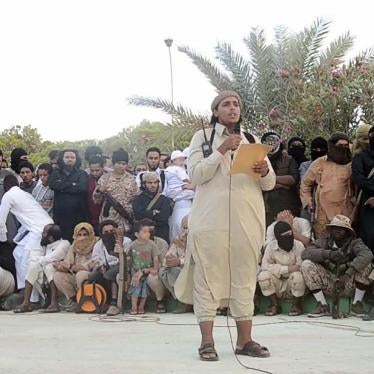(Beirut) – Clashes in Saudi Arabia’s Eastern Provinceshow the urgent need for Saudi officials to stop arbitrary arrests of peaceful protesters, relatives of wanted persons, and human rights activists, Human Rights Watch said today.
Interior Ministry officials said that the clashes, which broke out in ‘Awwamiyya, a Shia town, on October 3, 2011, and continued into the next day, injured 11 security personnel and three citizens, two of them women. Sources on the ground told Human Rights Watch that the likely trigger was the arrest on October 2 of two elderly residents of ‘Awwamiyya – Hasan Al Zayid, in his 70s, and Sa’id al-‘Abd al-‘Al, in his 60s – to pressure their sons to give themselves up to the police. The sons were wanted in connection with peaceful demonstrations from February to June in the Eastern Province.
“Seizing the elderly and infirm father of a wanted man to force him to surrender is thuggish through and through,” said Christoph Wilcke, senior Middle East researcher at Human Rights Watch. “Even more so when the state was pursuing the man for nothing more than peaceful activism.”
The Interior Ministry said that it would respond to the recent clashes with an “iron fist” against what it called “radicalized or hired instigators.” The statement blamed an unnamed foreign country, understood to be Iran, for instigating the strife.
Al Zayid collapsed shortly after his arrest and was taken by ambulance from ‘Awwamiyya to a nearby hospital. Fadhil al-Manasif, a local human rights activist who had been detained from May 1 until August 22 without charge for his alleged role in the peaceful demonstrations, went to the ‘Awwamiyya police station around 7:30 p.m. to protest the arrests of Al Zayed and al-‘Abd al-‘Al, saying they were illegal. When he followed Al Zayed’s ambulance to the hospital, security forces at a checkpoint arrested him.
Some hours later, officers transferred al-Manasif to Dhahran police station, where he remains. Inquiries by local activists revealed that he had been charged with “breaking the glass of a police vehicle” and “resisting security officers.” Police have not allowed al-Manasif’s family to visit him.
A friend of al-Manasif’s, who asked not to be named, inquired about al-Manasif at Dhahran police station early on the morning of October 3, but was himself arrested. He has since been released, as has al-‘Abd al-‘Al. Al Zayid remains in the hospital, and it is unclear whether he is still being detained. The previous week, security forces arrested the father of another man wanted in connection with the peaceful demonstrations by Shia Saudis in the Eastern Province. The police released the father after several days, although the son did not turn himself in.
Article 14 of the Arab Charter for Human Rights, to which the kingdom is a party, prohibits arbitrary arrest. The United Nations Working Group on Arbitrary Detentions says detentions are arbitrary if there is no clear legal basis for the arrest or if the person is arrested for exercising the human rights to freedom of expression and peaceful assembly, among others.
A Shia Saudi activist told Human Rights Watch that about 40 Shia Saudis remain in detention in the wake of peaceful demonstrations in the Eastern Province over the past few months.
“Saudi authorities should immediately stop arbitrary arrests of relatives, rights activists, and peaceful protesters,” Wilcke said.






